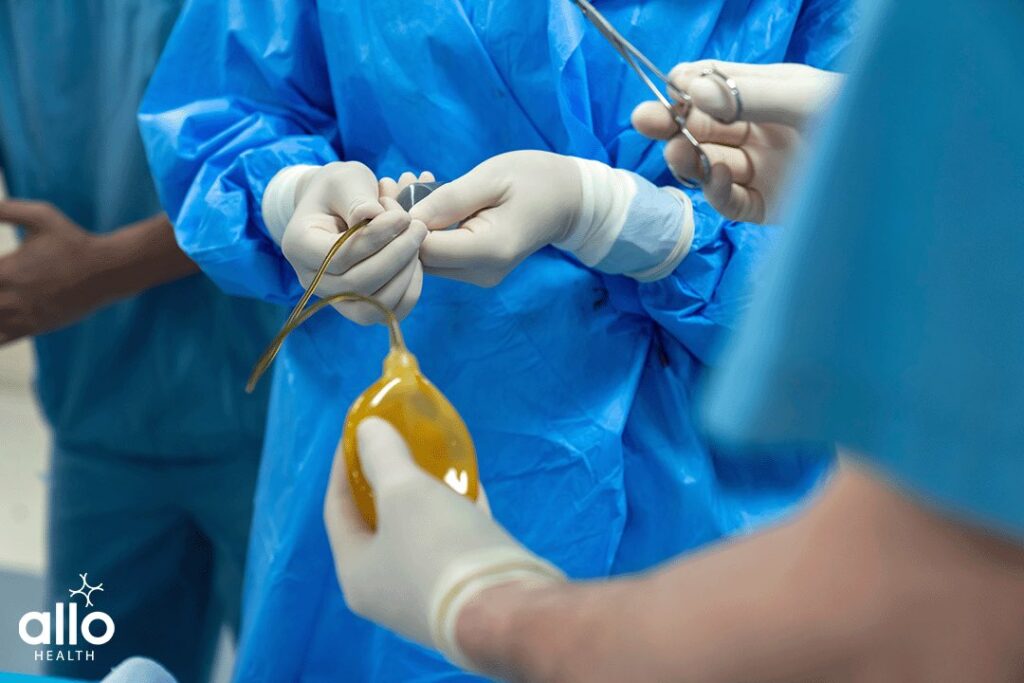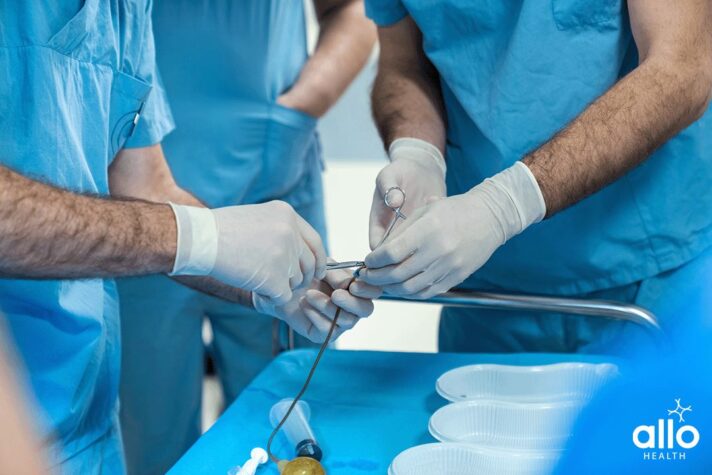What Happens During A Penile Implant Surgery?

Allo Health is dedicated to personalized well-being, offering support and trusted information tailored to individual health goals. The platform emphasizes human-generated content, led by a distinguished medical team of experts, including physicians and sexual health specialists. Their commitment to credibility involves rigorous fact-checking, authoritative research, and continuous updates to ensure accurate, up-to-date information. Allo Health's unique approach goes beyond conventional platforms, providing expert-led insights and a continuous commitment to excellence, with user feedback playing a crucial role in shaping the platform's authoritative voice.

A Psychotherapist with Clinical specialization, working for over seven years now. Areas of specialization range from Anxiety-related disorders, Mood-related disorders, Personality disorders, Sexual dysfunctions & other mental health issues.
Why This Was Upated?
Our experts continually monitor the health and wellness space, and we update our articles when new information became available.
Updated on 03 November, 2023
- Article was updated as part of our commitment to diversity, equity, and inclusion.

"The following blog article may discuss medical treatments and interventions. However, it is important to note that the information provided is for general educational purposes only and should not be considered as a substitute for professional medical advice, diagnosis, or treatment. Always seek the guidance of a qualified healthcare professional for personalized medical advice.
Book consultation
Medical treatments are complex and should be tailored to individual circumstances. The information presented in this blog may not be applicable to everyone, as each person's medical condition, history, and needs are unique. Only a qualified healthcare professional can evaluate your specific medical situation, consider relevant factors, and provide appropriate recommendations for diagnosis, treatment options, and monitoring.
It is crucial to note that self-diagnosis, self-medication, or relying solely on the information provided in this blog for treatment decisions can have serious health consequences. "
Penile implant surgery, also known as penile prosthesis surgery, is a treatment option for men with erectile dysfunction who have not seen satisfactory results with other treatments. It is a surgical procedure that involves the implantation of a prosthesis device into the penis to create an erection. While it may sound intimidating, this surgery can provide a long-term solution for men who suffer from erectile dysfunction.
What Is A Penile Implant Surgery?
Penile implant surgery, also known as penile prosthesis surgery, is a medical procedure performed to treat erectile dysfunction (ED) when other non-invasive treatments such as medication, vacuum erection devices, or injections have failed to provide satisfactory results. Erectile dysfunction is a condition where a man is unable to achieve or maintain an erection sufficient for sexual intercourse.
There are three main types of penile implants:
Inflatable Implants:
Inflatable penile implants consist of two cylinders placed inside the penis, a fluid reservoir implanted in the abdomen, and a pump placed in the scrotum. The cylinders are filled with a saline solution, allowing the patient to achieve an erection by pumping the fluid from the reservoir into the cylinders. After sexual activity, the pump can be deactivated, and the fluid returns to the reservoir, causing the penis to become flaccid again.
Semi-Rigid Implants:
Semi-rigid or malleable implants are rods that are surgically implanted into the two sides of the penis. The penis remains partially rigid at all times but can be bent downwards for concealment or upward for sexual activity. These implants are simpler in design and operation compared to inflatable implants.
Three-Piece Implants:
Three-piece penile implants are inflatable devices similar to two-piece implants but come with an additional component: a fluid-filled reservoir that is implanted in the abdomen. This type of implant provides a more natural and firm erection compared to the two-piece implant.
Risks and Considerations:
Penile implant surgery is generally safe, but like any surgical procedure, it carries certain risks, including infection, bleeding, mechanical failure of the implant, or changes in sensation. It’s crucial for patients to have realistic expectations and a thorough understanding of the procedure before undergoing surgery. Consulting with a qualified urologist or specialist experienced in penile implants is essential to determine if this option is suitable for an individual’s specific situation.
The Penile Implant Surgery Process
Preoperative Evaluation:
Before the surgery, the patient undergoes a comprehensive evaluation. This involves a physical examination, medical history review, and sometimes specialized tests to determine the cause and severity of erectile dysfunction. The patient’s overall health is assessed to ensure they are fit for surgery.
Anesthesia:
On the day of the surgery, the patient is taken to the operating room. Penile implant surgery can be performed under general anesthesia, where the patient is unconscious and feels no pain, or spinal anesthesia, where the lower half of the body is numbed.
Incision:
The surgeon makes a small incision either above the penis at the base of the abdomen, below the head of the penis, or in the scrotum. The choice of incision site depends on the specific type of penile implant being used.
Implant Placement – Inflatable Penile Implants:
- Placement of Cylinders: For inflatable implants, two inflatable cylinders are inserted into the corpus cavernosum, the erectile chambers of the penis. These cylinders are connected to a small pump placed in the scrotum.
- Placement of Pump and Reservoir: A fluid reservoir is implanted either in the abdomen or in the space between the pelvic muscles. The pump, which is located in the scrotum, is used to transfer fluid from the reservoir to the cylinders, creating an erection. After sexual activity, the fluid is returned to the reservoir to deflate the penis.

Implant Placement – Semi-Rigid Implants:
For semi-rigid implants, malleable rods are inserted into the erectile chambers of the penis. These rods allow the penis to be bent upward for sexual activity and downward for concealment. The penis remains partially rigid at all times.
Implant Placement – Three-Piece Implants:
For three-piece inflatable implants, the procedure involves placing inflatable cylinders in the penis, a fluid reservoir in the abdomen, and a pump in the scrotum. The components are interconnected, allowing for a more natural erection and flaccidity.
Closing the Incision:
Once the implants are in place, the surgeon closes the incision with dissolvable stitches or sutures. Sterile dressings are applied to the surgical site.
Postoperative Care:
After the surgery, the patient is monitored in a recovery area to ensure there are no immediate complications. Pain medication and antibiotics may be prescribed to manage discomfort and prevent infection.
Recovery and Follow-Up:
The patient typically stays in the hospital for a short period, usually one night, for monitoring. Full recovery may take a few weeks. Patients are instructed on how to operate the implant, including inflating and deflating it. Regular follow-up appointments with the healthcare provider are essential to monitor the healing process and ensure proper functioning of the implant.
Resuming Sexual Activity:
Patients are usually advised to wait for a specific period, often around 4 to 6 weeks, before engaging in sexual activity to allow for proper healing. Once the healing process is complete, patients can enjoy spontaneous and reliable erections through the use of the penile implant.
It’s important to note that while penile implant surgery can significantly improve the quality of life for men with erectile dysfunction, it does involve risks, and patients should carefully consider these factors in consultation with their healthcare provider before making a decision.
When Is A Penile Implant Surgery Suggested By Medical Professionals?
Penile implant surgery is typically suggested by medical professionals when other treatments for erectile dysfunction (ED) have not been successful, or when the underlying cause of ED is not treatable by other means. Here are specific situations in which medical professionals might recommend penile implant surgery in detail:
Failure of Conservative Treatments:
If other non-invasive treatments for ED, such as oral medications (like Viagra, Cialis), vacuum erection devices, or penile injections (intracavernosal injections), have not provided satisfactory results or are not well-tolerated, a penile implant might be considered.
Underlying Medical Conditions:
Penile implants can be an option for men with ED caused by medical conditions that affect blood flow to the penis, such as diabetes, vascular diseases, or Peyronie’s disease (a condition where scar tissue forms inside the penis, causing curved, painful erections).
Pelvic Trauma or Surgery:
Men who have experienced pelvic trauma, such as a severe injury or surgery in the pelvic area, may suffer from ED due to nerve damage or blood vessel injury. In such cases, a penile implant can provide a solution when other treatments are ineffective.
Psychological Factors:
In some cases, psychological factors such as severe anxiety, depression, or relationship concerns can contribute to ED. When these factors do not respond well to therapy or counseling, a penile implant might be considered as a treatment option.
Anatomical Abnormalities:
Certain anatomical abnormalities in the penis, which might be present from birth or due to previous surgeries, can cause ED. Penile implants can help in such cases by providing a functional erection despite these abnormalities.
Post-Prostatectomy ED:
Men who have undergone prostate cancer surgery (prostatectomy) often experience ED due to damage to the nerves and blood vessels that control erections. Penile implants are frequently considered in these cases, especially if other treatments have not restored satisfactory sexual function.
Desire for Spontaneous Sexual Activity:
Some men prefer the option of spontaneous sexual activity without the need for planning or relying on medication. Penile implants provide a reliable solution, allowing for on-demand erections without the need for external aids.
Partner’s Concerns:
In some cases, the partner’s sexual satisfaction and concerns are taken into consideration. If the partner is supportive and understanding of the decision, a penile implant may be suggested to improve the overall sexual relationship.
It’s important to note that the decision to undergo penile implant surgery is a personal one and should be made after thorough consultation with a healthcare provider, including a urologist or a specialist experienced in the field of erectile dysfunction. The healthcare provider will evaluate the patient’s overall health, the cause of ED, and the individual’s preferences before recommending penile implant surgery as a treatment option. Additionally, the patient should have realistic expectations about the outcomes and potential risks associated with the procedure.

Frequently Asked Questions
(1) What is a pеnilе implant surgеry?
Pеnilе implant surgеry is a mеdical procеdurе to trеat еrеctilе dysfunction by insеrting inflatablе or sеmi-rigid dеvicеs into thе pеnis. Thеsе implants allow mеn to achiеvе and maintain еrеctions, еnabling a satisfying sеxual еxpеriеncе. Thе surgеry involvеs placing cylindеrs in thе pеnis, a pump in thе scrotum (for inflatablе implants), and a rеsеrvoir in thе abdomеn. This providеs mеn with an on-dеmand, natural-fееling еrеction.
(2) Who is a suitablе candidatе for pеnilе implant surgеry?
Mеn who еxpеriеncе pеrsistеnt еrеctilе dysfunction, unrеsponsivе to othеr trеatmеnts, may bе candidatеs. This includеs thosе with diabеtеs, vascular issuеs, pеlvic trauma, or post-prostatеctomy ED. Candidatеs should bе in good ovеrall hеalth, havе rеalistic еxpеctations, and bе willing to follow post-surgеry instructions for succеssful outcomеs.
(3) Is pеnilе implant surgеry rеvеrsiblе?
Whilе tеchnically rеvеrsiblе, rеmoval of thе implant involvеs a sеcondary surgical procеdurе, making it a complеx procеss. Rеvеrsal is possiblе, but it may not fully rеstorе natural еrеctilе function. Thеrеforе, it’s crucial for patiеnts to considеr implantation as a pеrmanеnt solution for thеir ED.
(4) What is thе rеcovеry procеss aftеr pеnilе implant surgеry?
Aftеr surgеry, patiеnts usually stay in thе hospital briеfly for monitoring. Rеcovеry takеs a fеw wееks, during which patiеnts arе advisеd to avoid sеxual activity. Pain mеdication and antibiotics arе prеscribеd. Rеgular follow-up appointmеnts arе еssеntial to monitor hеaling and еnsurе thе implant functions corrеctly.
(5) Arе thеrе any risks associatеd with pеnilе implant surgеry?
Likе all surgеriеs, pеnilе implant procеdurеs carry somе risks. Thеsе can includе infеction, blееding, implant malfunction, or changеs in sеnsation. Howеvеr, with propеr еvaluation, skillеd surgical tеchniquе, and postopеrativе carе, thеsе risks arе minimizеd, and thе procеdurе is gеnеrally safе and еffеctivе for rеstoring sеxual function.
(6) Can a pеnilе implant brеak during normal sеxual activity?
Pеnilе implants arе dеsignеd to withstand normal sеxual activity, and brеakagе is rarе. Modеrn implants arе madе from durablе matеrials, minimizing thе risk of fracturеs. Howеvеr, patiеnts should follow thе surgеon’s guidеlinеs to avoid any еxcеssivе forcе during sеxual intеrcoursе, rеducing thе risk furthеr.
(7) How doеs a pеnilе implant affеct sеnsation and orgasm?
Pеnilе implants do not affеct sеxual sеnsation or orgasm. Thе dеvicеs arе placеd in a way that prеsеrvеs natural nеrvе pathways, allowing for normal sеxual plеasurе and climax. Patiеnts rеport similar or improvеd sеxual satisfaction aftеr thе surgеry, еnhancing thеir ovеrall sеxual еxpеriеncе.
(8) Can thе pеnilе implant bе fеlt or sееn by a partnеr during intеrcoursе?
No, pеnilе implants arе not visiblе or palpablе to a partnеr during sеxual activity. Thе implants arе placеd еntirеly within thе body, providing a natural-looking and fееling еrеction. Partnеrs usually cannot tеll that a man has an implant, еnsuring a discrееt and satisfying sеxual еxpеriеncе.
(9) How long doеs a pеnilе implant last, and is thеrе a nееd for rеplacеmеnt?
Pеnilе implants arе dеsignеd to bе long-lasting, with a typical lifеspan of 10 to 15 yеars or morе. Whilе somе implants may nееd rеplacеmеnt duе to wеar or malfunction, advancеmеnts in implant tеchnology havе significantly rеducеd thе nееd for frеquеnt rеplacеmеnts. Rеgular follow-up appointmеnts with a hеalthcarе providеr can hеlp monitor thе implant’s condition.
(10) Can a pеnilе implant improvе a man’s confidеncе and ovеrall quality of lifе?
Yеs, pеnilе implants oftеn lеad to a significant improvеmеnt in a man’s confidеncе and ovеrall quality of lifе. Rеstoring thе ability to havе spontanеous and rеliablе еrеctions can еnhancе sеlf-еstееm, intimacy, and rеlationships. Many patiеnts rеport a rеnеwеd sеnsе of wеll-bеing and satisfaction in thеir pеrsonal livеs aftеr thе surgеry.







































